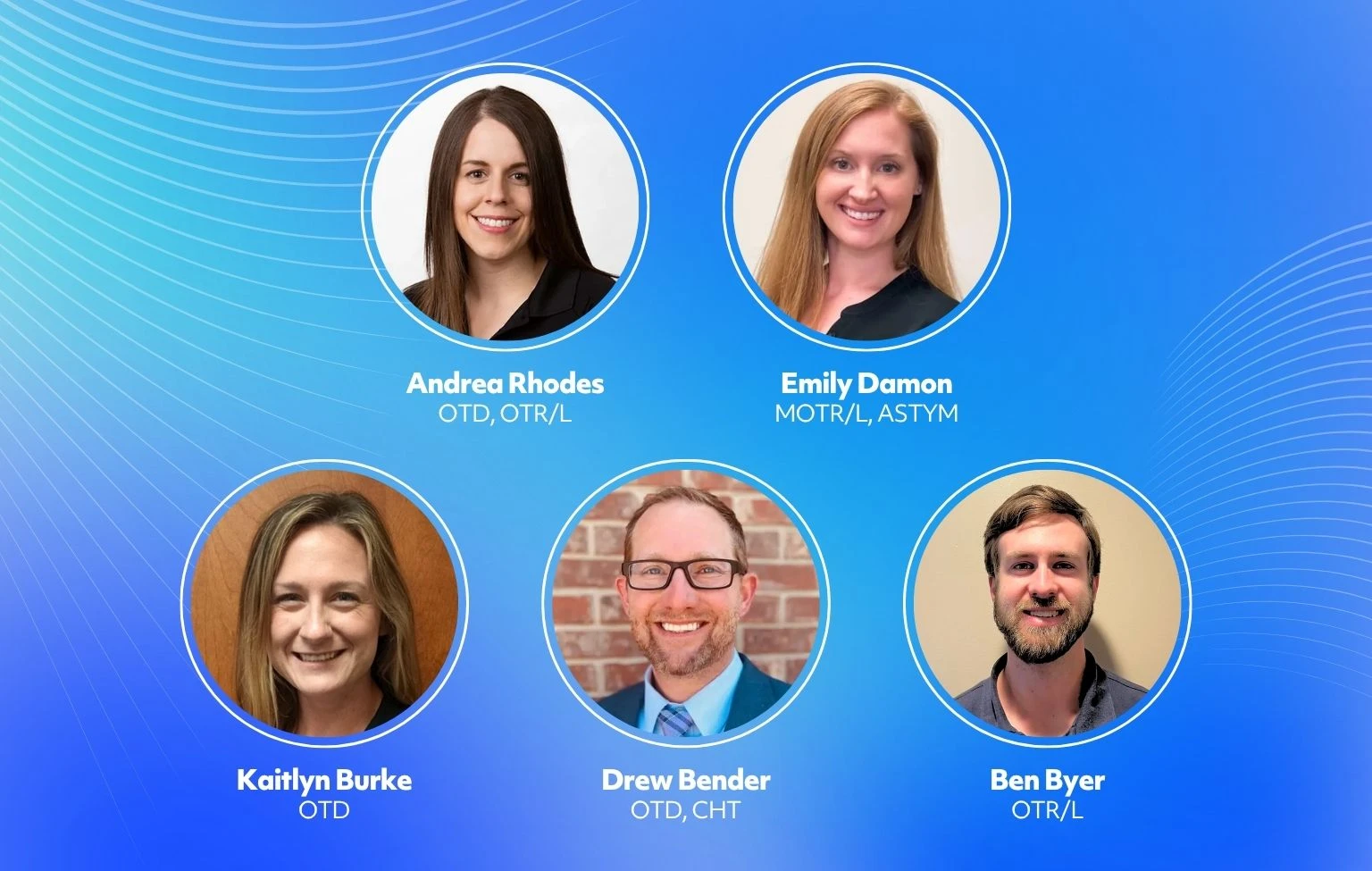Ask any occupational therapist why they chose OT, and you'll get a story that starts with people. For some, it's a lifelong calling. For others, it's a discovery made by chance. But the common thread is the same: a desire to help others reclaim independence, confidence and quality of life.
Here, five occupational therapists share why they chose the profession and what keeps them inspired every day.
A Family Tradition and a New Perspective
For Andrea Rhodes, OTD, OTR/L, OT runs in the family. "I have two aunts and a cousin who are all OTs," she said. "When I was a kid, I thought they just played board games and did crafts for a living."
Years later, Rhodes realized there was far more purpose behind the play. As she learned how her relatives used creativity to rebuild function and confidence for their patients, her curiosity grew into a career.
While working as an office manager at a physical therapy clinic, she saw the difference between physical and occupational therapy firsthand. "The OT wasn't just doing exercises," she said. "They were helping people practice real tasks: opening jars, turning doorknobs, getting dressed. It just looked more meaningful."
Now a hand therapist at Advanced Physical Therapy, Rhodes says her favorite part of the job is "digging out someone's positivity" when recovery feels hard. "No one has the same backstory," she said. "If I can help someone get back to what's meaningful to them, that's the best part of my day."
Creativity That Makes a Difference
For Ben Byer, OTR/L, the first introduction to OT came from his grandmother, who worked in the field. "I didn't really know what that meant at the time," he said. "But later, when I started researching careers in health care, I was drawn to how creative OT could be."
Now a hand therapist at All Star Physical Therapy, Byer says the creative side of OT keeps him motivated. "You have to think outside the box every day," he said. "No two people are the same. One patient might need to practice twisting a jar lid; another might want to get back to rock climbing. The work changes with each person."
That kind of problem-solving, he says, is what sets occupational therapy apart. "People expect it to be just like physical therapy," Byer said. "But our focus is on what people actually want to do with their lives. It's function over form."
A Career Pivot With Purpose
Some therapists find OT later in life, and that's part of what makes the profession so dynamic. For Emily Damon, OTR/L, a career change led her to occupational therapy after being laid off from a different industry.
"I qualified for a worker retraining program, so I started researching jobs that were meaningful and in demand," she said. "I kept seeing occupational therapy, but I didn't know what it was."
After interviewing several practitioners, she enrolled in an occupational therapy assistant (OTA) program, later bridging to a master's degree. "I fell in love with how broad the field is," Damon said. "With one license, I could work in mental health, rehabilitation, pediatrics, you name it."
Now a certified hand therapist with RET Physical Therapy, she thrives on the moments of progress that happen in real time. "When a patient grips a coffee cup again or brings me a painting they created with their recovered hand, that's everything," she said. "Those are the moments that remind me I made the right choice."
A Chance Decision That Changed Everything
Drew Bender, OTD, didn't plan to become an occupational therapist. In fact, he applied to college as a future physical therapy major. But when a last-minute change of schools redirected his path, OT was the program available.
"I started reading about it and thought, OK, this sounds interesting," he said. "It was one of those serendipitous moments. Looking back, it was the best thing that could've happened."
Seventeen years later, Bender is a certified hand therapist and regional director for ProRehab in Indiana. What started as an unexpected turn became a calling. "I love connecting with people," he said. "There's so much psychology and meaning in what we do. You help people get their lives back, sometimes in ways they didn't even expect."
For Bender, occupational therapy also fulfills a sense of purpose. "I'm a science-driven guy, but I'm also spiritual," he said. "This profession lets me do both: to use my skills to make a tangible difference every day."
Finding Her Fit Through Function
For Kaitlyn Burke, OTD, the journey to OT began with a teammate's story. "In high school, I met a swimmer who competed in the Paralympics," she said. "She worked with an OT to adapt to her disability, and I thought it was incredible."
That experience sparked her interest in rehabilitation, and during college shadowing hours, she realized she was hooked. "It just felt right," Burke said. "You're solving puzzles all day: figuring out why something isn't working and how to help someone regain function."
Now practicing at Lake Centre for Rehab, Burke specializes in hand and upper-extremity therapy. "Every patient is different," she said. "Some come in at their lowest point. If I can help them get back to the things that matter, playing golf, cooking, holding their grandkids, that's what makes it worth it."
More Than a Career
Each therapist's story is unique, but their reasons for choosing OT share a common core: creativity, compassion and connection. Occupational therapy is where science meets humanity, where problem-solving and empathy work hand in hand.
So why occupational therapy? Because no two people, or days, are ever the same. Because progress isn't just measured in motion. It's measured in meaning.


